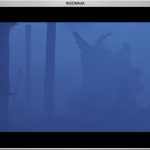Electronic Literature circa WWW (and Before)
Chris FunkhouserChris Funkhouser reads the Electronic Literature Collection Vol. 1 as a crucial document, an effective reflection of literary expression and areas of textual exploration in digital form.
Biopoetics; or, a Pilot Plan for a Concrete Poetry
Eugene ThackerEugene Thacker resituates the work of Eduardo Kac, not as art applied to the life sciences, but as a form of bio-poetics, consistent with the electro-poetics that has been a longtime focus of critical writing in ebr. Rather than reduce the work to its material (in life-forms, or in text, or in code), Thacker identifies ways that language, form, and life intersect in works of bio-art.
Art, Empire, Industry: The Importance of Eduardo Kac
Sandy BaldwinSandy Baldwin identifies Eduardo Kac as a conceptual artist, a
forerunner of electronic poetry, and a critical writer whose essays
perform their own content: "writing on new media art as new media
art."
Three from The Gig: New Work By/About Maggie O’Sullivan, Allan Fisher, and Tom Raworth
Gregory BettsThree recent poetry publications by Nate Dorward's press The Gig are reviewed by Greg Betts; these are not poems so much as environments outside of, perhaps astride, the contingencies of systems.
Seeing the novel in the 21st Century
Mike BarrettMike Barrett evaluates Steve Tomasula's The Book of Portraiture in terms of its place between tradition and artistic innovation in the 21st century.
Saving the Past: Deleuze’s Proust and Signs
Stephen Bernard HawkinsStephen Hawkins engages with the "web of counterintuitive, paradoxical, contentious and yet important claims" that he identifies in Gilles Deleuze's Proust and Signs.
Reading the Conflicting Reviews: The Naysayers Gerald Graff overlooked in Clueless in Academe
Geneviève BrassardGeneviève Brassard defends Gerald Graff's original approaches in Clueless in Academe against his critics - for the problem with Graff's book does not lie between the covers but rather between the ears of those who fault him excessively for sins of omission and commission.
How to Do Words with Things
Stephen DoughertyOne of a series of eco-critical reviews, Stephen Dougherty explores the new ways that "matter is made to matter" in Ira Livingston's writing on science and literature. The payoff of an ecocriticism grounded in the materiality of language itself, can bee seen by the strong political positioning toward the end of Dougherty's essay.
Plagiarism, Creativity, and the Communal Politics of Renewal
Christian MoraruAs Christian Moraru argues here that the new is still the objective in contemporary writing. But writers and artists make it by making it anew rather than new ("Get it used," Andrei Codrescu invites us), a new not so much novel as renovated, reframed and reproduced rather than produced, which by the same token redefines and advertises authorship as deliberate plagiarism.
